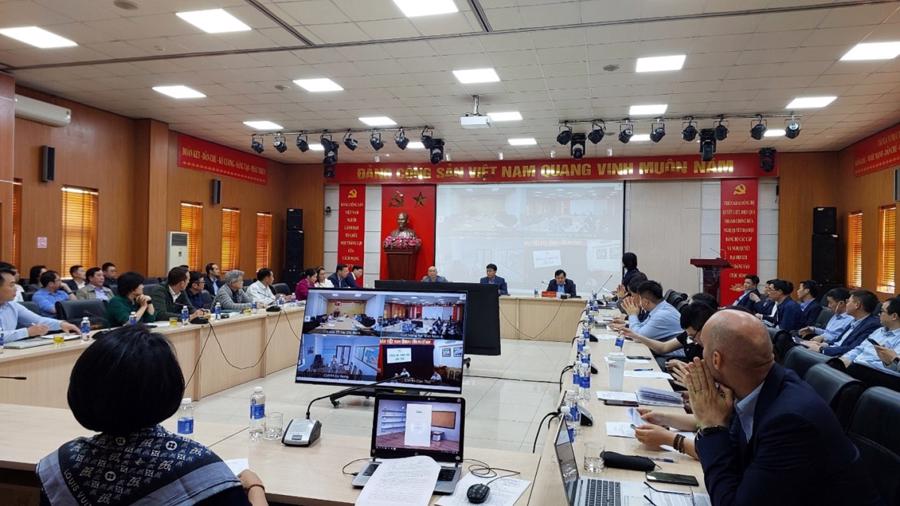The meeting on the surcharge of container transport services for import and export by sea was chaired by Le Do Muoi, Director General of the Vietnam Maritime Administration.
SHARP INCREASE IN FEES BENEFITS FOREIGN SHIPPING COMPANIES
During the meeting, Phan Thong, Secretary-General of the Vietnam Shippers’ Association, stated that the Terminal Handling Charges (THC) collected by shipping lines for container goods has changed significantly, causing major disruptions for shippers. Therefore, he recommended that the government review and adjust related regulations, including the inclusion of THC fees in the list of charges that must be declared.
“According to international practice, THC fees are used to cover 80% of the handling costs at ports, but in Vietnam, only about 40% is paid. However, shipping lines have increased their fees by about three times the adjusted handling costs, causing significant losses for shippers.”
Pham Quoc Long, Vice Chairman of the Association of Agents, Brokers, and Maritime Services.
In his statement at the meeting, Le Quang Trung, Deputy General Director of Vietnam Maritime Corporation (VIMC), emphasized that the majority of Vietnam’s import and export goods are transported by foreign shipping lines, mainly the top 10 shipping lines.
Foreign shipping lines only need to announce price changes 15 days before the adjustment, without the need for inspections, explanations of cost components, or any reports or constraints from relevant authorities.
Explaining further, Trung said that there are several reasons for the increase in fees by shipping lines, including the need for some lines to maintain and ensure delivery schedules when they cannot pass through the Suez Canal, affecting their commercial commitments.
However, the fee increases lack transparency and clear mechanisms, and thus the legal framework needs to be examined to ensure appropriate management of shipping lines’ surcharges.

Speaking on behalf of shipping lines, Hoang Thi Hong, representative of CU Lines, affirmed that Vietnam is their top priority market. CU Lines commits to accompany businesses, monitor and implement the regulations of the State, and reconsider the surcharges for container transport services to ensure reasonable adjustments.
Maersk Lines is one of the few shipping lines that have not increased THC fees recently and currently have no plans to do so. A representative of Maersk Lines expressed the desire to stabilize the market and affirmed that if there are plans to increase THC fees, the company will comply with the regulations and notify the Vietnam Maritime Administration and relevant agencies.
According to representatives from the Price Management Department (Ministry of Finance) and the Import-Export Department (Ministry of Industry and Trade), Vietnam has a unique position in terms of import and export activities. Vietnam is also a significant source of revenue for shipping lines. Therefore, shipping lines need to change their perspectives and respect the Vietnamese market, carefully consider their business activities in Vietnam.
In the near future, the Price Management Department and Import-Export Department will strengthen coordination with the Vietnam Maritime Administration to implement stricter regulations, ensure transparent pricing mechanisms, and effectively manage THC fees in Vietnam.
STRICT CONTROL OVER SHIPPING LINES, ENSURING TRANSPARENCY OF PRICES
In a recent letter to the Prime Minister and related ministries and agencies, the Vietnam Shippers’ Association proposed three measures to enhance the management of surcharges imposed by foreign shipping lines.
First, include the THC fee for container transport services in the list of declared charges to improve the management mechanism for pricing and surcharges at ports, avoiding arbitrary price increases that may affect the rights of import-export businesses.
Shipping lines should provide reports on the structure of THC fees. If these surcharges are excessively profitable, relevant authorities should consider applying special consumption taxes.
Second, review and issue regulations to manage the collection of various fees, compare them with the provisions of Vietnamese laws and international practices, and require shipping lines to immediately stop charging unreasonable fees.
Furthermore, it is recommended that the Prime Minister promptly issue appropriate mechanisms to manage fee collection by foreign shipping lines operating in Vietnam.
Third, refer to the experience of managing foreign shipping lines in neighboring countries to develop and improve measures for enhancing control over the activities of foreign shipping lines, avoiding revenue losses for the state budget and protecting the interests of domestic enterprises.
After listening to the reports from associations, businesses, and relevant government agencies, Le Do Muoi, Director General of the Vietnam Maritime Administration, emphasized the need for industry associations and shipping lines to engage in discussions, negotiations, and trade associations to find suitable solutions that benefit all parties involved.
As the specialized state management agency for maritime affairs, the Vietnam Maritime Administration will continue to cooperate with the Price Management Department (Ministry of Finance) and the Import-Export Department (Ministry of Industry and Trade) to strengthen inspections and strict control over the operations of shipping lines and intermediary companies to ensure transparency in pricing and create a healthy business environment, promoting sustainable development of maritime transportation.
Additionally, the Director General believes that Vietnam is a market with a large volume of import and export goods in the region and is a potential market for shipping lines. Therefore, shipping lines need to balance their costs, reduce surcharges that support import-export businesses during difficult times.
In response to the enhanced management of surcharges imposed by foreign shipping lines, the Ministry of Finance stated that according to the regulations in the Price Law and related guidelines, the surcharges for container transport services are not included in the list of goods and services subject to state pricing, price stabilization, and declared pricing.
Previously, the Ministry of Transport had proposed to include THC fees in the list of declared charges in the Price Law 2023 and the implementation decree but did not provide sufficient explanation of the compatibility with legal regulations on pricing, maritime laws, and international practices, as well as the necessity of including this service in the declared pricing list.
Regarding the proposal to impose special consumption taxes, there is currently insufficient information and basis for taxation. Therefore, further research and data collection are needed.
The Ministry of Finance suggested that the Ministry of Transport handle the proposals of the Association of Agents, Brokers, and Maritime Services of Vietnam and the Vietnam Shippers’ Association according to its competent authority. The Ministry of Finance will participate based on its responsibilities and functions and the proposals from the Ministry of Transport.
Currently, shipping lines impose about 10 types of surcharges on goods at ports, such as THC fees, document fees, fuel surcharges, container cleaning fees, etc.
Accordingly, THC fees are charged per container based on the number of containers shipped by the consignor to cover the costs of handling at ports. The average fee for a 20-foot dry container is about $139, and $213 for a 40-foot container. The THC fee for a 20-foot refrigerated container is approximately $184, and $266 for a 40-foot refrigerated container. Since the beginning of 2024, foreign shipping lines have continuously announced a 10-20% increase in THC fees for each type of container service.















